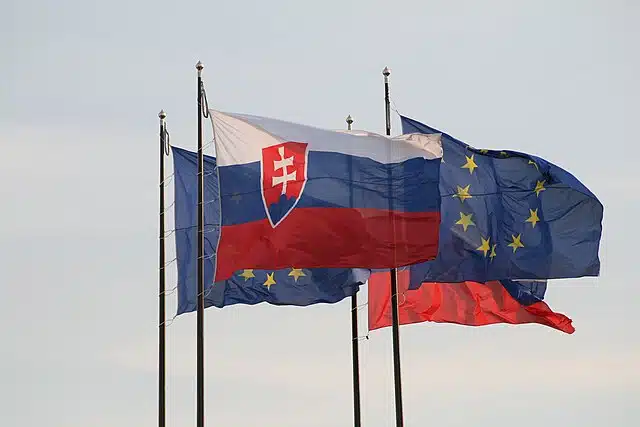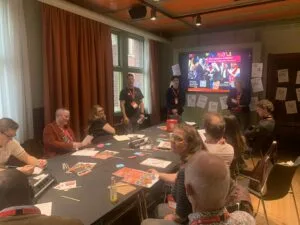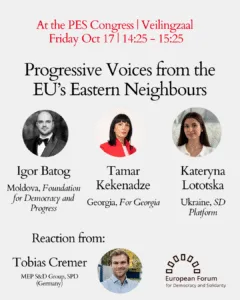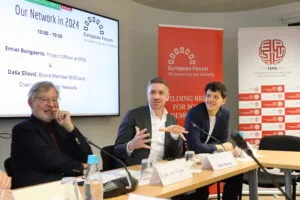Photo: Wikimedia Commons
On the 30th of September, early general elections were held in Slovakia. The populist pro-Russian Smer-SD party led by former prime minister Robert Fico won with 24% of the votes. The international community has looked at the elections with fear as Fico has taken a pro-Russian stance and promised to stop support for Ukraine. Foundation Max van der Stoel talked with Peter Kmec, member of parliament for the third biggest party Hlas (Voice), to interpret the results and ask about the intentions of the party. Hlas, a social-democratic party which split from Fico’s party in 2020, received 15% of the votes and seems to hold a key position in forming a coalition.
First of all congratulations on becoming the third biggest party. Are you happy with the results at Hlas?
I think the initial assessment is that Hlas reached a historic result when it comes to the number of votes for a party that participated for the first time. So we are historically the strongest ‘political virgin’ in the parliament so to say. I’m happy from this perspective. Of course we expected better results in comparison towards Smer, who won the election. Now we are actually the weaker part of the centre-left.
How was the campaign towards the elections? Was it more tense than usual in Slovakia?
Yes, it has actually two aspects. One aspect is that the political campaigns are getting more and more tense in the democratic world as a whole. These external factors and clashes between the right and the left, conservatives and liberals, influenced the domestic Slovak campaign as well. And, secondly, the radicalisation of the political scene in Slovakia, which complicated the centre-right parties. Also mobilisation of the electorate against Robert Fico and his party made this election very controversial and very radical.
What were the main topics in Slovakia during these elections for voters?
Definitely the situation around the economy, because the previous government brought the economy into total disaster (political turmoil created economic stagnation in the country, red.). The inflation numbers are very high, the highest in the Eurozone. People are frustrated and angry, that’s why the voters punished the centre-right parties. A number of them didn’t make it to the parliament and others are heavily weakened. So economy was the main factor as many people are a victim of this economic situation.
And secondly, we cannot avoid the situation in Ukraine, because Slovakia is a neighbouring country. This situation also dominated the political discussion towards the election.
A lot of EU observers have followed the Slovakian elections with some concern, and the results are perceived as a change of pace for Slovakia’s support for Ukraine in its war against Russia. Do you agree with this?
Looking at the results of the elections, one of the positive outcomes is that most radical political parties didn’t make it to the parliament. The extreme right-wing Republika, which openly promoted very radical positions on the EU and even supported the exit from NATO, didn’t make it. Most major political parties are in favour of EU and NATO, so that is a very good start. Of course, in the political campaign there were different positions on how to deal with the situation in Ukraine. Smer had their own position, especially on refusing to provide any more military assistance. But there are statements by some representatives of the party that Smer meant only the ownership of Slovak armed forces’ armaments and equipment. These are actually more or less depleted at the moment because most of it has already been sent to Ukraine during the previous government. As there is almost nothing to be sent from the reserves of the Slovak armed forces, there is also nothing to block. When it comes to the production especially in the area of munition, I think there might be an agreement to continue with this military assistance.
Do you think Fico will be able to hold on to his pro-Russian expressions, or has it just been part of his campaign rhetoric?
Let’s believe that this was mostly aimed at winning support among the Slovak electorate. There is a sizable amount of the population that wants to stop the war as soon as possible, for the basic reason that it creates a kind of concern and possible danger for many Slovaks. Mister Fico extensively used these concerns among the population in his campaign. However, I strongly believe that the new Slovak government will definitely stick to the common EU and NATO positions and we will not break with them when it comes to the support for Ukraine.
Have you noticed more international attention for the elections? If yes, how so?
Yes, that’s mostly due to the fact that Slovakia really is a neighbour to Ukraine and that we, as a country, are really critical in keeping the unity of the international community when it comes to the support of Ukraine. For Slovakia, the most important goal is containing the territorial integrity and sovereignty of Ukraine because the future of Slovakia is based on these basic principles of international law. Any critical voices that actually challenge the EU position are strongly monitored by the international media and community. I’m confident that the future government will continue a strong position in favour of the EU, not joining the forces that are undermining it.
What do you expect from the upcoming coalition formation? What are the various coalition possibilities according to you?
There are two new political parties on the centre-right spectre: the Christian-democratic party and Progressive Slovakia party. They were supposed to cooperate, but the first day after the elections showed that they have unsurmountable differences. The most important development for us is the position of the Christian-democratic party, because they could join either the coalition with us (Hlas) and Smer, or the centre-right coalition with Progressives, but none of that seems to be realistic for the Christian-democrats. They are refusing to join either of the two options because of an internal divide. For one part of the party cooperation with Smer is a no-go, for the other part cooperation with the Progressives is a no-go. This disqualifies them from any government and sends them to the opposition. This is kind of a deadlock we are now trying to solve, which pushes us to a coalition with Smer. Analysts and the media rightly point out that a coalition between Smer and Hlas is more realistic than the centre-right coalition plus Hlas.
So your party is willing to cooperate with Smer?
We will have to weigh all the options. Currently the only option looks like the coalition between Smer and Hlas, due to the fact that the Christian-democrats are refusing to join any coalition formation. If there is a need to form a majority in the parliament, and there is because of the dramatic economic situation and the need for a stable government, Hlas is open to it.
For which issues will Hlas be fighting at the coalition table?
We have our top-three priorities. As a social-democratic party we will look into the portfolios like social agenda and labour market. We focus on the healthcare, especially the quality of hospitals. We have plenty of money from the Recovery Plan assigned for reform of the healthcare system. And lastly, the support for regions, in different aspects. Our aim will be to bring back the investments in the regions, because we have many underdeveloped regions in Slovakia. We would like to close the gap between east and west. This can only be done through active regional policies.
We cannot compromise on the foreign policy orientation of Slovakia. We will stick to our active membership in the EU and NATO. We will continue our active support for Ukraine and start talking about economic recovery. And of course the security situation in Europe is very sensitive, which asks us to find the best possible ways to stabilise the situation. So a very active security and foreign policy as part of the EU and NATO is high on our list as well.
The president of Slovakia Caputova has given Smer-SD’s leader Fico two weeks to form a new government. Fico will have to seek cooperation with both pro-Russian (SNS – Slovak National Party) and pro-EU parties (Hlas) to gain a majority in the 150-seat Slovak Parliament. A coalition without Smer-SD is possible but does not seem likely.
Written by Timon Driessen



